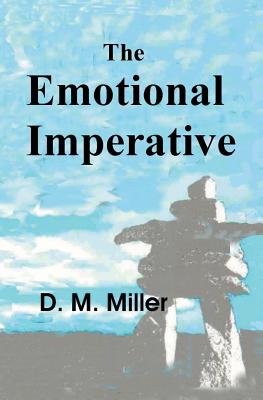Emotional Imperative: How Emotions Rule Our Lives
$13.50
Description
The human mind employs logic to reach its decisions. This involves thinking in a linear, step-by-step manner about how a problem may be solved. Given an initial premise, a conclusion is deduced. Using this conclusion as a new (or interim) premise, a further conclusion is derived. In this manner a chain of reasoning is possible. The power of the human intellect lies in its ability to formulate long and complex chains of reasoning. But what the intellect is incapable of doing, is generating the initial premises without which reasoning cannot proceed. It is at this point that the emotions intervene by supplying these essential features. Consider the proposition: “I want to survive – therefore I must eat – therefore I must catch a fish – therefore I must make a net.” In this chain of reasoning, the initial premise (I want…) does not stem from a previous logical deduction and therefore must be inherent, that is, instilled in us by our genes. We posses a large number of such inherent drives or urges, that constitute our initial premises and whose verbal expressions all contain words such as ‘want’ ‘wish’, ‘desire’ etc. Such terms are basically emotional and without logical antecedents. Other examples of initial premises provided by our genes are – a desire for membership in a group – for companionship – for happiness, etc. These premises have been termed ’emotional imperatives’ – emotional because they have no logical derivation and ‘imperative’ because they are urges to attain specific goals (group membership, companionship, happiness, etc.). Mankind, throughout its evolutionary history, has possessed few powerful physical defenses such as speed, strength, sharp teeth or claws. It has, however, exhibited a very effective behavioral characteristic – the desire and ability to form groups, such as tribes or nations, that have provided protection for individual humans, and especially, for their offspring. It is not enough for individuals simply to join a group. In addition, those doing so must behave within the group in such a manner as to make themselves acceptable to the other members. In fulfilling this requirement, individuals are aided by possession of the appropriate goals and concepts. Probably the most important such concepts each of us possesses, is a belief in the existence of an ‘authority beyond oneself, to which we owe allegiance. Although this concept is vague, so powerful is it, that it is frequently personified as ‘God’ or ‘the nation’. We believe that by accepting the reality of this authority and submitting to it, we will be protected by it.
Author: Miller, D M
Topic: Psychology
Media: Book
ISBN: 1453601481
Language: English
Pages: 190
Additional information
| Weight | 0.45 lbs |
|---|---|
| Dimensions | 8 × 5.25 × 0.4 in |















Reviews
There are no reviews yet.